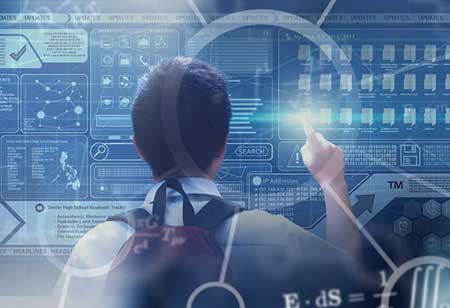THANK YOU FOR SUBSCRIBING
Be first to read the latest tech news, Industry Leader's Insights, and CIO interviews of medium and large enterprises exclusively from Education Technology Insights
Exploring the Latest Trends in Distance Learning
Distance learning has emerged as a prominent and viable alternative to traditional classroom education in recent years.

By
Education Technology Insights | Tuesday, September 19, 2023
Stay ahead of the industry with exclusive feature stories on the top companies, expert insights and the latest news delivered straight to your inbox. Subscribe today.
Artificial intelligence, gamification, AR/VR, and social learning will enhance engagement and collaboration. Microlearning, personalization, and accessibility measures will make education more flexible and inclusive.
FREMONT, CA: Distance learning has emerged as a prominent and viable alternative to traditional classroom education in recent years. As technology advances and the global educational landscape evolves, distance learning constantly transforms and adapts.
Artificial Intelligence (AI) Integration:
Artificial Intelligence has been steadily gaining ground in education, and its integration into distance learning is set to soar in 2023. AI-powered chatbots and virtual assistants will provide personalized guidance and support to students, making their learning experience more efficient and engaging. AI algorithms will also aid in content curation and adaptive learning, tailoring educational materials to individual student needs.
Gamification for Enhanced Engagement:
Gamification techniques will continue revolutionizing distance learning by incorporating game elements into educational activities. Interactive quizzes, leaderboards, and virtual rewards will motivate students to actively participate, enhancing their engagement and knowledge retention. Gamified learning platforms will provide an immersive and enjoyable learning experience, especially for younger learners.
Applications of AR and VR:
AR and VR technologies are set to make significant strides in distance learning. Immersive experiences will transport students to virtual classrooms, historical events, or scientific simulations, enhancing their understanding and practical skills. VR headsets and AR applications will enable students to explore virtual worlds and engage in collaborative learning experiences, breaking the barriers of physical distance.
Social Learning and Collaboration:
Distance learning can sometimes feel isolating, but 2023 will witness an increased emphasis on social learning and collaboration. Online platforms will integrate discussion forums, virtual study groups, and video conferencing tools to facilitate peer-to-peer interaction and knowledge sharing. Students can engage in group projects, exchange ideas, and foster a sense of community, enhancing their overall learning experience.
Microlearning and Bite-sized Content:
In an era of information overload, micro-learning, and bite-sized content will become increasingly popular in distance education. Instead of lengthy lectures, educators will focus on delivering concise, digestible modules that can be consumed in short bursts. This trend will enable learners to manage their time effectively, making learning more accessible and adaptable to busy schedules.
Personalized Learning Pathways:
Personalized learning pathways will gain prominence in 2023, driven by advancements in data analytics and learner profiling. Intelligent algorithms will analyze student performance and preferences, allowing educators to tailor learning materials and assignments to individual needs. Adaptive learning platforms will provide targeted interventions and recommendations, fostering better learning outcomes.
Accessibility and Inclusion:
Distance learning has the potential to address accessibility challenges and promote inclusivity. In 2023, educational institutions will prioritize making online courses and platforms accessible to learners with disabilities. Captioning, audio descriptions, and screen readers will be integrated, ensuring all students can access and participate in distance education equally.
Continued Professional Development for Educators:
As distance learning becomes more prevalent, the need for ongoing professional development for educators will grow. In 2023, institutions will invest in training programs designed to help teachers effectively facilitate remote education. Workshops, webinars, and online courses will focus on pedagogical approaches, technology integration, and effective online communication.
Blockchain for Credentialing and Certification:
Blockchain technology will revolutionize how credentials and certifications are issued and verified in distance learning. In 2023, educational institutions will increasingly adopt blockchain-based systems to ensure academic records' security, transparency, and portability. Students will have greater control over their credentials, allowing for seamless transferability and validation of their achievements.







